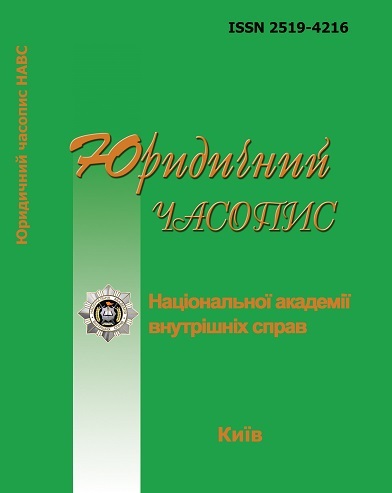THE ROLE OF ATTORNEY-DEFENDER IN THE CRIMINAL PROCESS: INTERNATIONAL-LEGAL ASPECT
Keywords:
lawyer, counsel, Ukraine, United Kingdom, the advocacy
Abstract
The article studies the issues of legal status and the role of counsel in criminal proceedings because such a right was expressly provided for in the Constitution of Ukraine, on the example of Ukraine and great Britain showing the main points regarding the structure of the legal profession in these countries, the formation of the bar as a separate institution, the analysis of the differences in the formation of this structure in different countries, the proposed changes concerning the activities of the legal profession in Ukraine, taking into account foreign experience.Downloads
Download data is not yet available.
Abstract views: 80 PDF Downloads: 30
How to Cite
[1]
Dudko, O. 1. THE ROLE OF ATTORNEY-DEFENDER IN THE CRIMINAL PROCESS: INTERNATIONAL-LEGAL ASPECT. Law Magazine of the National Academy of Internal Affairs. 14, 2 (1), 416-422.
Issue
Section
International experience
Copyright (c) 2018 Law Magazine of the National Academy of Internal Affairs

This work is licensed under a Creative Commons Attribution-NonCommercial-NoDerivatives 4.0 International License.
- Authors reserve the right to authorship of their own work and transfer to the magazine the right of the first publication of this work under the terms of the Creative Commons Attribution License, which allows other persons to freely distribute published work with mandatory reference to authors of the original work and the first publication of an article in this magazine.
- Authors have the right to enter into separate additional agreements on non-exclusive dissemination of the work in the form in which it was published in the journal (for example, to post an article in the institution's repository or to publish as part of a monograph), provided that the link to the first publication of the work in this journal is maintained.
- The journal's policy allows and encourages the posting of articles by authors on the Internet (for example, in electronic storehouses of institutions or on personal websites), both before the submission of this manuscript to the editorial office and during its editorial processing, as this contributes to the creation of a productive scientific discussion and positively affects the efficiency and dynamics of citing the published work.




